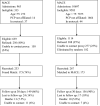Evaluation of the Mobile Acute Care of the Elderly (MACE) service
- PMID: 23608775
- PMCID: PMC3691362
- DOI: 10.1001/jamainternmed.2013.478
Evaluation of the Mobile Acute Care of the Elderly (MACE) service
Abstract
Importance: Older adults are particularly vulnerable to adverse events during hospitalization for acute medical problems. The Mobile Acute Care of the Elderly (MACE) service is a novel model of care delivered by an interdisciplinary team, designed to deliver specialized care to hospitalized older adults to improve patient outcomes.
Objective: To evaluate the impact of the MACE service when compared with general medical service (usual care).
Design: Prospective, matched cohort study.
Setting: The Mount Sinai Hospital, an urban tertiary acute care hospital.
Participants: Patients aged 75 years or older admitted because of an acute illness to either the MACE service or usual care. Patients were matched for age, diagnosis, and ability to ambulate independently.
Exposures: Admission to the MACE service when compared with admission to usual care.
Main outcome measures: Patient outcomes included incidence of adverse events, including falls, pressure ulcers, restraint use, and catheter-associated urinary tract infections, along with length of stay, rehospitalization within 30 days, functional status at 30 days, and patient satisfaction during care transitions, measured with the 3-item Care Transition Measure.
Results: A total of 173 matched pairs of patients were recruited. The mean (SD) age was 85.2 (5.3) and 84.7 (5.4) years in the MACE and usual-care groups, respectively. After adjustment for confounders, patients in the MACE group were less likely to experience adverse events (9.5% vs 17.0%; adjusted odds ratio, 0.11; 95% CI, 0.01-0.88; P = .04) and had shorter hospital stays (0.8 days, 95% CI, 0.7-0.9; P = .001) than patients receiving usual care. Patients in the MACE group were not less likely to have a lower rate of rehospitalization within 30 days than those in the usual-care group (odds ratio, 0.91; 95% CI, 0.39-2.10; P = .83). Functional status did not differ between the 2 groups. Care Transition Measure scores were 7.4 points (95% CI, 2.9-11.9; P = .001) higher in the MACE group.
Conclusions and relevance: Admission to the MACE service was associated with lower rates of adverse events, shorter hospital stays, and better satisfaction. This model has the potential to improve care outcomes among hospitalized older adults.
Trial registration: clinicaltrials.gov Identifier: NCT00927160.
Comment in
-
ACE, MACE, and GRACE: time to put the pieces together: comment on "effects of an acute care for elders unit on costs and 30-day readmissions".JAMA Intern Med. 2013 Jun 10;173(11):987-9. doi: 10.1001/jamainternmed.2013.493. JAMA Intern Med. 2013. PMID: 23608885 No abstract available.
References
-
- Creditor MC. Hazards of hospitalization of the elderly. Ann Intern Med. 1993 Feb 1;118(3):219–223. - PubMed
-
- [August 13, 2012];Serious reportable events. 2012 http://www.qualityforum.org/Topics/SREs/Serious_Reportable_Events.aspx.
-
- Bakker FC, Robben SH, Olde Rikkert MG. Effects of hospital-wide interventions to improve care for frail older inpatients: a systematic review. BMJ Qual Saf. 2011 Aug;20(8):680–691. - PubMed
-
- Baztan JJ, Suarez-Garcia FM, Lopez-Arrieta J, Rodriguez-Manas L, Rodriguez-Artalejo F. Effectiveness of acute geriatric units on functional decline, living at home, and case fatality among older patients admitted to hospital for acute medical disorders: meta-analysis. BMJ. 2009;338:b50. - PMC - PubMed
-
- Counsell SR, Holder CM, Liebenauer LL, et al. Effects of a multicomponent intervention on functional outcomes and process of care in hospitalized older patients: a randomized controlled trial of Acute Care for Elders (ACE) in a community hospital. J Am Geriatr Soc. 2000 Dec;48(12):1572–1581. - PubMed
Publication types
MeSH terms
Associated data
Grants and funding
LinkOut - more resources
Full Text Sources
Other Literature Sources
Medical


